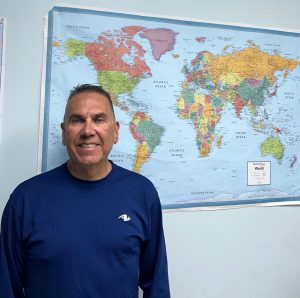
Written by Sandy Chase
In the few months that Tony has been teaching at Project Light, he’s learned from Executive Director Elena Farkas, her staff, and other volunteers. He’s grateful for their support, saying that he’s now current with the standards and the educational materials.
Tony shares a special relationship with his adult students because like them, English isn’t his first language, so he can appreciate their challenges of adopting/adapting to a new culture. Having been recruited at 19 to play baseball at Tampa University, he left Caracas, Venezuela, to live in the States, where he’s mastered English.
Identifying with his pupils, Tony is a role model, sharing his strategies for being prolific in a second language, while his learners teach him more effective ways to guide individual adults to success. They agree that he’s made it easier for them to progress because of his patience and explanations.
Vaness Labarca says, “Tony looks for different ways for us to understand. He’s an excellent teacher because he’s professional, making sure the group masters our Level 1 English. I would like him to continue with us so we can learn more from him.”
According to Lidia Mendoza, “Tony clarifies my confusion. He gives us examples so we can differentiate the many tenses. He also encourages us to practice and repeat the context.”

Elena Farkas, Executive Director
Affirming others, Elena Farkas says, “I’m impressed by Tony’s commitment and punctuality, and, especially, his unwavering dedication as a PL teacher. His excellent professional ethics, integrity, humor, caring, and positive nature make him a dependable asset to our team.”
Elena says that during their initial interview, Tony’s unique blend of skills, cultural connection, and experiences immediately stood out, reinforced by his management, IT, strategic planning, and training expertise. Coupled with his eagerness to learn, he’s invaluable to all at Project Light, enriching our student’s academic experiences.
“Teaching English is a new endeavor for Tony, although as a Marine, he taught infantry courses at a US Marine Corps (USMC) seminar. To prepare for PL classes, he studies the teaching materials and creates lesson plans, focusing on developing students’ speaking skills.”
Pleased with his wanting to master all facets of teaching, Elena says, “Tony has enrolled in a TEFL ( Teaching English as a Foreign Language) class and has begun implementing those methods in his two classes, one in the morning, and the other in the evening.”
On one side of his educator coin is learning patience and the process from his students. When he flips the coin, he instills in them perseverance so they can achieve their goals, perhaps teaching the next generation.
Interview with Tony Matute
How did you find out about PL?
I recently moved to the Bradenton area and wanted to do something more with my spare time. I researched the Internet for volunteer positions until I saw Project Lighting of Manatee, thinking that this school would be a great new experience, enhancing my teaching and learning skills.
Why did you decide to pursue teaching at PL?
I wanted to give something back to the community. Helping adults learn English motivated me because English isn’t my first language, and I wasn’t fortunate to have others practice with me.
Tell us about your time in Tampa, after having been recruited to play for Tampa University. What did you study at Tampa?
Tampa was my first school before transferring to the University of Kansas (KU). Originally, I wanted to design and build aircraft. My bachelor’s is in mechanical engineering. I experienced a new world of mastering English while absorbing the knowledge related to my studies.
It was difficult maintaining a B average to keep my scholarship alive, but I persevered—as I tell my PL students. I also completed a master’s degree in computer information systems, with an emphasis in programming technology.
What happened after graduating from KU.
I joined the USMC and went to Officer Candidate School in Virgina, where I received my commission as an officer. After 11 years, I retired from the Marines as Major after two deployments to Iraq and one to Afghanistan, where I was wounded in combat. After all that pain and suffering, I decided to hang up my “boots” and retire.
Then I worked for a Department of Defense insurance company, writing code for software engineering. I had other programming jobs, including my current position as a senior software engineer.
How do you use your mechanical engineering skills and knowledge at PL?
I apply hard and soft skills, including analysis, technological programming, and understanding engines. I also enlist problem solving and training for my students. I want them to succeed.
What was learning English like? Any similarities between PL courses and your experience?
I learned some English during high school and while attending both universities as an international student. I also learned English as a Second Language (ESL) in college. Some strategies I find useful are those from my studying English: (1) presentation, (2) practice, and (3) production.
By “forgetting” Spanish, I have used English for all my communication in the States. I hardly use my native Spanish language unless I am talking to non-English speaking relatives.
I focused on understanding English by reading newspapers and highlighting words I didn’t understand, looking them up in the dictionary for synonyms and antonyms. Watching the news and reading lots of books increased my vocabulary. I also recorded my own conversations many times to fine-tune my pronunciation and listened to music to learn lyrics.
Although English is my language now, I also know Italian, which my paternal grandfather spoke. I also enrolled in Italian grammar and conversational courses at KU. Occasionally I speak Italian and watch Netflix shows in that language.
When did you know that you had mastered English?
It’s hard to say, but when I was able express myself fluently, understand complex ideas, and comfortably engage in conversations with other English speakers without hesitation or needing to translate my thoughts.
What classes are you teaching at PL?
I’ve been substituting for other teachers when they need to take personal time. Recently, I’ve been teaching Karine’s class on Mondays and Wednesdays: teaching Intro A, the beginning level. I’m fortunate that PL staff has provided me with teacher material and books, and I’m using audio/video resources from online books for each level. I also encourage students to use apps and material to improve their grammar and comprehension.
What are your challenges? Rewards?
Every new experience is a new challenge: to learn the process and procedures to become an effective educator, finding effective ways for students to learn English progressively. In my short time at PL, I’ve had so much fun. I also feel a great sense of satisfaction.
How do you assist struggling students?
One of the purposes of being a teacher is to guide students who are having difficulties in and out of the classroom. I request that students to ask only me so they find what they’re looking for—without getting confused.
How have your students taught you?
I believe that learning can be a double-sided process in which teacher and students are in a symbiotic relationship, teaching one another. I’m learning from my students how to be more patient and a better listener, as they’re grasping English.
Do you volunteer elsewhere?
I used to be a youth baseball coach in Kansas, and I might do something like that here, but I’ve yet to explore that possibility.
What are your hobbies?
I love baseball, biking, and cooking, I also like going on scuba diving/snorkeling trips. I enjoy watching sunsets at the beach and windsurfing, but I just started.
What’s your advice to others thinking about volunteering?
Volunteering allows you to connect to the community. Even helping out with the smallest tasks can make a real difference.



